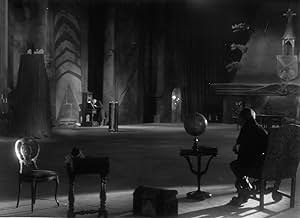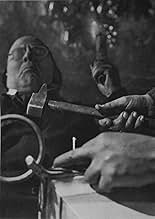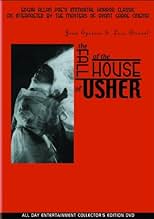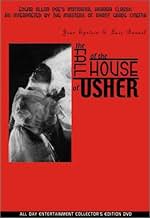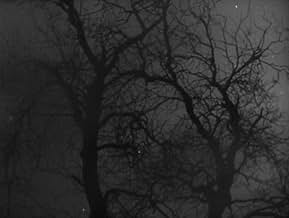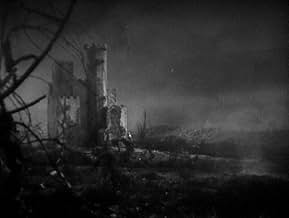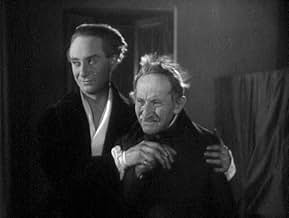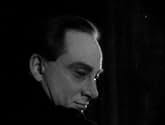NOTE IMDb
7,2/10
4,8 k
MA NOTE
Allan visite la sinistre maison de la famille Usher, où son ami Roderick peint un portrait de sa femme Madeline, souvent malade. Le portrait semble absorber la vie de Madeline, la menant len... Tout lireAllan visite la sinistre maison de la famille Usher, où son ami Roderick peint un portrait de sa femme Madeline, souvent malade. Le portrait semble absorber la vie de Madeline, la menant lentement à sa mort.Allan visite la sinistre maison de la famille Usher, où son ami Roderick peint un portrait de sa femme Madeline, souvent malade. Le portrait semble absorber la vie de Madeline, la menant lentement à sa mort.
- Réalisation
- Scénario
- Casting principal
Avis à la une
Wow! Words cannot describe how absolutely magical this film is, but I will try. Its not often that a film will truly captivate me from moment one as this one has, especially in the world of silent film. Its been a long time since I've been glued to the screen in complete rapture. Granted, I like the silent medium and of course I respect it, but usually I watch them as a piece of film history; I see them for what they are and judge them only amongst their peers: other silent films. But this silent film is like no other! There were many times when I felt as though if Guy Maddin were to make a actual serious film this would be it. Anyone who has seen 'Cowards Bend The Knee' or 'Saddest Music In The World' will know what I'm referring to. Throughout the film I kept thinking that it looked "new" and was made to look old. Some of the special effects such as the swirling fog were just mesmerizing so much so that I found myself wondering why in our modern day we haven't done something so simple yet effective (at least as compared to the films I've experienced).
Even the score that they created for it was incredible. There were some scenes in the beginning of the film, especially ones where Allan was approaching the house, that I didn't think quite fit, but for the rest of the 95% of the film it went along with the action of the film perfectly.
While everything in the film is as close to perfect as film gets, I must point out the acting was so well done as to almost bring me to tears. I cant quite explain how that is possible, but it is. Each tiny emotion shows through so remarkably well. I really would love to commend the actor who played Roderick Usher for his wonderful display. I even feel right in comparing his acting to the likes of the female lead in 'The Passion Of Joan Of Arc' -- and thats hard to beat!
Oh, and the cinematography! Its absolutely impeccable! And I'm not just saying that due to the fact that "its the best they could do back then". It really could rival any modern day film in that regard. It makes me miss shots of a large looming building from down below instead of the aerial helicopter shots most films use now; so macabre and eerily inviting. This film was definitely ahead of its time thats for sure.
I'm not sure how much a screenplay translates to a silent film, but whatever/however Bunuel contributed, it definitely worked. Even though there weren't any overtly surrealistic things going on, you could definitely smell the Bunuel in it. The film is like a dream that you don't want to wake up from even though at its heart it is a nightmare.
Even the score that they created for it was incredible. There were some scenes in the beginning of the film, especially ones where Allan was approaching the house, that I didn't think quite fit, but for the rest of the 95% of the film it went along with the action of the film perfectly.
While everything in the film is as close to perfect as film gets, I must point out the acting was so well done as to almost bring me to tears. I cant quite explain how that is possible, but it is. Each tiny emotion shows through so remarkably well. I really would love to commend the actor who played Roderick Usher for his wonderful display. I even feel right in comparing his acting to the likes of the female lead in 'The Passion Of Joan Of Arc' -- and thats hard to beat!
Oh, and the cinematography! Its absolutely impeccable! And I'm not just saying that due to the fact that "its the best they could do back then". It really could rival any modern day film in that regard. It makes me miss shots of a large looming building from down below instead of the aerial helicopter shots most films use now; so macabre and eerily inviting. This film was definitely ahead of its time thats for sure.
I'm not sure how much a screenplay translates to a silent film, but whatever/however Bunuel contributed, it definitely worked. Even though there weren't any overtly surrealistic things going on, you could definitely smell the Bunuel in it. The film is like a dream that you don't want to wake up from even though at its heart it is a nightmare.
Predictably morbid and grim, this early cinematic tribute to Poe offers some interesting images and beautifully haunting music. I liked the sequence showing the lace-draped coffin, as it was carried out of that cavernous room.
More stylistic than substantive, the overall effect of the film is to engender a sense of suffocating gloom, rather than to tell an interesting story. It's very much like what one would expect in a nightmare. Space seems strung-out. People are not quite real. Pacing is so slow as to render time suspended between two swings of the clock pendulum.
I don't recall a film that conveyed such an overwhelming sense of introverted bleakness, oppression, and ubiquitous death. Even the trees were dead.
A lot of viewers will find this film lifeless ... so to speak. But for those interested in the antiquity of the occult, or Poe in particular, this film will excite like no other.
More stylistic than substantive, the overall effect of the film is to engender a sense of suffocating gloom, rather than to tell an interesting story. It's very much like what one would expect in a nightmare. Space seems strung-out. People are not quite real. Pacing is so slow as to render time suspended between two swings of the clock pendulum.
I don't recall a film that conveyed such an overwhelming sense of introverted bleakness, oppression, and ubiquitous death. Even the trees were dead.
A lot of viewers will find this film lifeless ... so to speak. But for those interested in the antiquity of the occult, or Poe in particular, this film will excite like no other.
I've read the Poe source for this film more times than I can remember, and Epstein's film captures that story's sense of decay and degeneracy the best by far. Corman's version can't hold a candle to this film; in fact, I feel as if I'm doing a grave disservice to Epstein's work by mentioning Corman's film in the same sentence with it. Let it pass.
Although I'd read about Epstein's USHER for many years and pondered the stills, particularly of the Lady Madeline in her billowing, winding sheet, I was not at all prepared for the terrifying beauty and hypnotic delirium of this motion picture.
It's certainly not for all tastes, and, for those not particularly well-read in outre or occult literature, it will be inscrutable. But for those with an open mind and an appreciation of convulsive beauty, it's hard to find a more exquisite film.
Although I'd read about Epstein's USHER for many years and pondered the stills, particularly of the Lady Madeline in her billowing, winding sheet, I was not at all prepared for the terrifying beauty and hypnotic delirium of this motion picture.
It's certainly not for all tastes, and, for those not particularly well-read in outre or occult literature, it will be inscrutable. But for those with an open mind and an appreciation of convulsive beauty, it's hard to find a more exquisite film.
The Fall of the House of Usher is about... well, I suppose it's about someone, Allan, visiting the house of Usher, run by Roderick, who lives with his sick wife Madeline and spends most of his time painting and trying to find a cure for whatever her supernatural-esquire disease is. The rest of what happens I cannot really say. Maybe because I'm still not totally sure myself. While I've yet to read the original Poe story, or see the later, more well known Roger Corman production with Vincent Price, I would probably advise on what little I know in comparing both films for the 1960 version if you're most concerned about sticking straight to the story.
Apparently, by the way, Luis Bunuel, who was director Jean Epstein's chief collaborator, quit after creative clashes over this issue. For whatever reason it was, I'd be hard-pressed to figure on how much influence he did or didn't leave on the picture. As it stands, and probably sticking to a certain aesthetic that was familiar for those in love with Poe, the silent version of Fall of the House of Usher is chock full of atmosphere in every kind of delicious, creepy, wonderful kind of connotation. The production design is sometimes full of a smoke, or a smoke-filled tint from the camera, and the outside of the mansion is covered in dirty fields and dead trees. The inside of the house, the interiors of the walls, the mirrors, the paints of Roderick's, and the placement of the camera in some strange angles (i.e. guitar) all build up to something unexpected.
Would I call it surrealism just because of Bunuel's involvement? Yes and no. Yes in that, of course, there are some striking moments that could only come out of a dream &/or a desire to just completely tool around with the audience's head just for the hell of it. And no because it's really Epstein's movie through it all, and he crafts this mostly as a somber, quietly intense picture where he experiments not in as a surrealist but as a director of contemplative Gothic horror. I can't even totally understand what absorbed me, but everything in the 'plastic', technical sense of the word did, not to mention the performances by Debucourt, Lamy, and especially Gance who all seem to be drifting in and out of the fantastical consciousness that seems to be living in this place, where life and death merge or go un-hinged, and (as another reviewer noted) is like a slow-poisoning prison.
Just, as I said, don't watch it to be wrapped up in 'what happens next in the "plot"', as it's more about what may happen in the next twist with a setting or a mood, or if a character should suddenly have a look that changes everything. It's not the greatest of the near-end silent period, but it's close.
Apparently, by the way, Luis Bunuel, who was director Jean Epstein's chief collaborator, quit after creative clashes over this issue. For whatever reason it was, I'd be hard-pressed to figure on how much influence he did or didn't leave on the picture. As it stands, and probably sticking to a certain aesthetic that was familiar for those in love with Poe, the silent version of Fall of the House of Usher is chock full of atmosphere in every kind of delicious, creepy, wonderful kind of connotation. The production design is sometimes full of a smoke, or a smoke-filled tint from the camera, and the outside of the mansion is covered in dirty fields and dead trees. The inside of the house, the interiors of the walls, the mirrors, the paints of Roderick's, and the placement of the camera in some strange angles (i.e. guitar) all build up to something unexpected.
Would I call it surrealism just because of Bunuel's involvement? Yes and no. Yes in that, of course, there are some striking moments that could only come out of a dream &/or a desire to just completely tool around with the audience's head just for the hell of it. And no because it's really Epstein's movie through it all, and he crafts this mostly as a somber, quietly intense picture where he experiments not in as a surrealist but as a director of contemplative Gothic horror. I can't even totally understand what absorbed me, but everything in the 'plastic', technical sense of the word did, not to mention the performances by Debucourt, Lamy, and especially Gance who all seem to be drifting in and out of the fantastical consciousness that seems to be living in this place, where life and death merge or go un-hinged, and (as another reviewer noted) is like a slow-poisoning prison.
Just, as I said, don't watch it to be wrapped up in 'what happens next in the "plot"', as it's more about what may happen in the next twist with a setting or a mood, or if a character should suddenly have a look that changes everything. It's not the greatest of the near-end silent period, but it's close.
I had the chance to see this film about 20 years ago and it's still quite fresh in my mind (if you knew me you'd find this very unusual). I still remember how I was wrapping myself up during the course of the film as I was feeling colder and colder - it was a summer night, mind you.
The plot sticks tightly to the original story and it shows France's affinity with Edgar Allan Poe since it was the great Charles Beaudelaire himself who translated Poe's work into French.
The film manages to create an unusual sense of discomfort unlike most classic horror films where the settings etc. result more in a feeling of (uneasy) cosiness. The insanity in Roderick Usher's face is utterly believable as well as the parts of the other characters. What tops it all up is the constant draught in the mansion. Wall hangings are steadily moving and bits of paper and dust are blowing through the corridors. Hence the above mentioned feeling of physical coldness.
All I can say is I need to see this film again and I would be grateful if anyone could point me in the right direction (Quelq'un en France, peut-etre?).
The plot sticks tightly to the original story and it shows France's affinity with Edgar Allan Poe since it was the great Charles Beaudelaire himself who translated Poe's work into French.
The film manages to create an unusual sense of discomfort unlike most classic horror films where the settings etc. result more in a feeling of (uneasy) cosiness. The insanity in Roderick Usher's face is utterly believable as well as the parts of the other characters. What tops it all up is the constant draught in the mansion. Wall hangings are steadily moving and bits of paper and dust are blowing through the corridors. Hence the above mentioned feeling of physical coldness.
All I can say is I need to see this film again and I would be grateful if anyone could point me in the right direction (Quelq'un en France, peut-etre?).
Le saviez-vous
- AnecdotesLuis Buñuel, who was Assistant Director, quit the picture after clashing with producer/director Jean Epstein over Epstein's decision to basically ignore Edgar Allan Poe's story.
- ConnexionsEdited into Histoire(s) du cinéma: Une vague nouvelle (1999)
Meilleurs choix
Connectez-vous pour évaluer et suivre la liste de favoris afin de recevoir des recommandations personnalisées
- How long is The Fall of the House of Usher?Alimenté par Alexa
Détails
- Durée1 heure 12 minutes
- Couleur
- Mixage
- Rapport de forme
- 1.33 : 1
Contribuer à cette page
Suggérer une modification ou ajouter du contenu manquant

Lacune principale
What is the German language plot outline for La chute de la maison Usher (1928)?
Répondre
